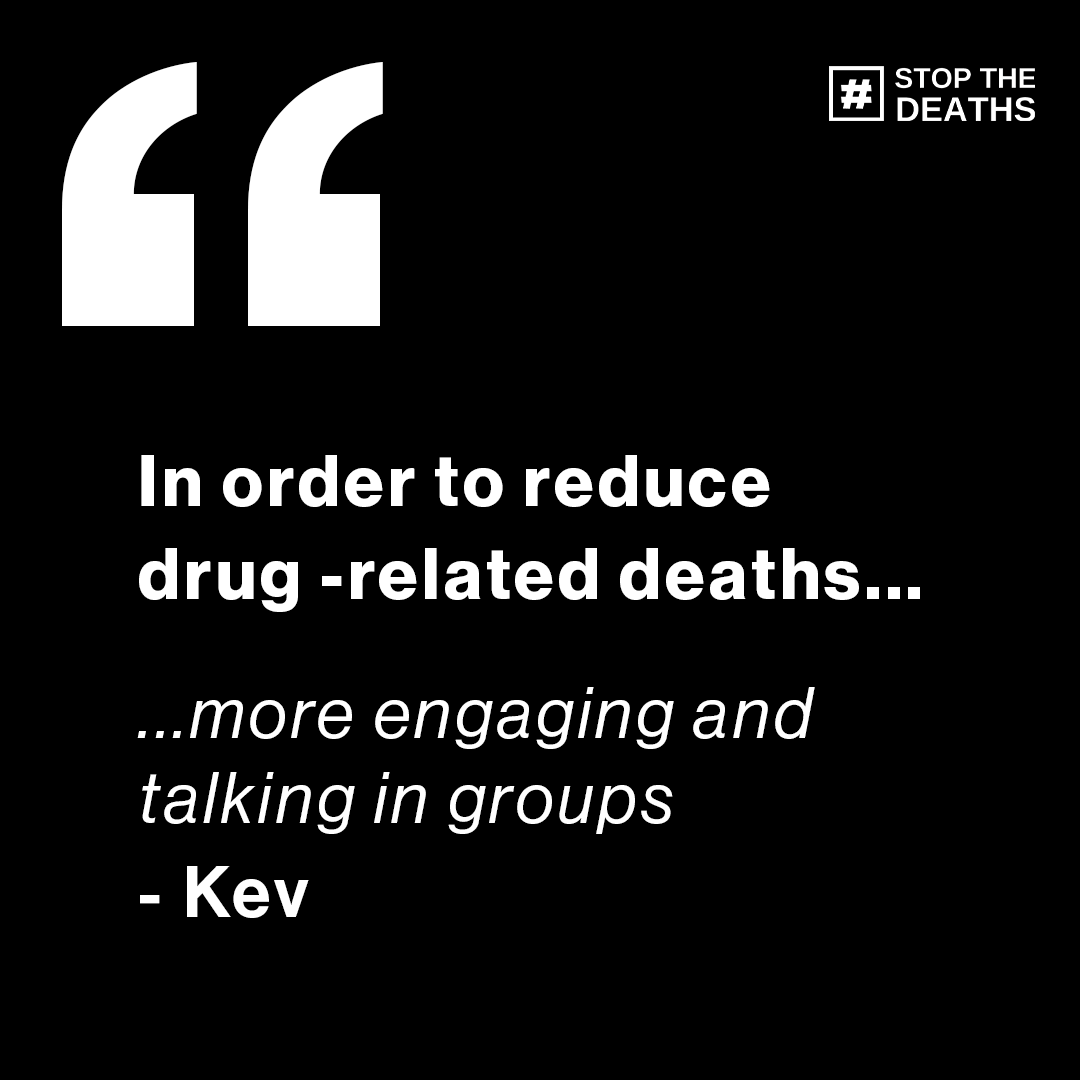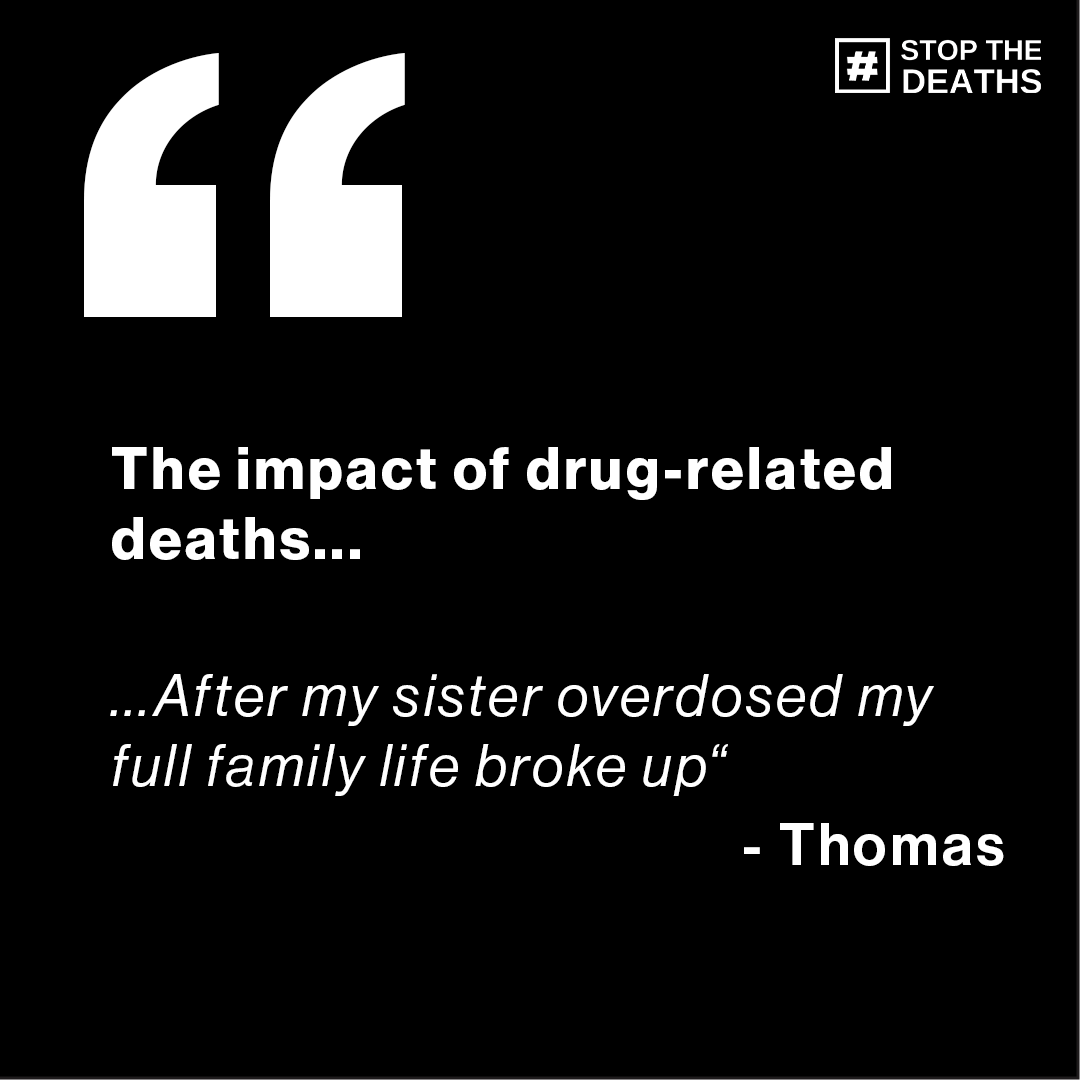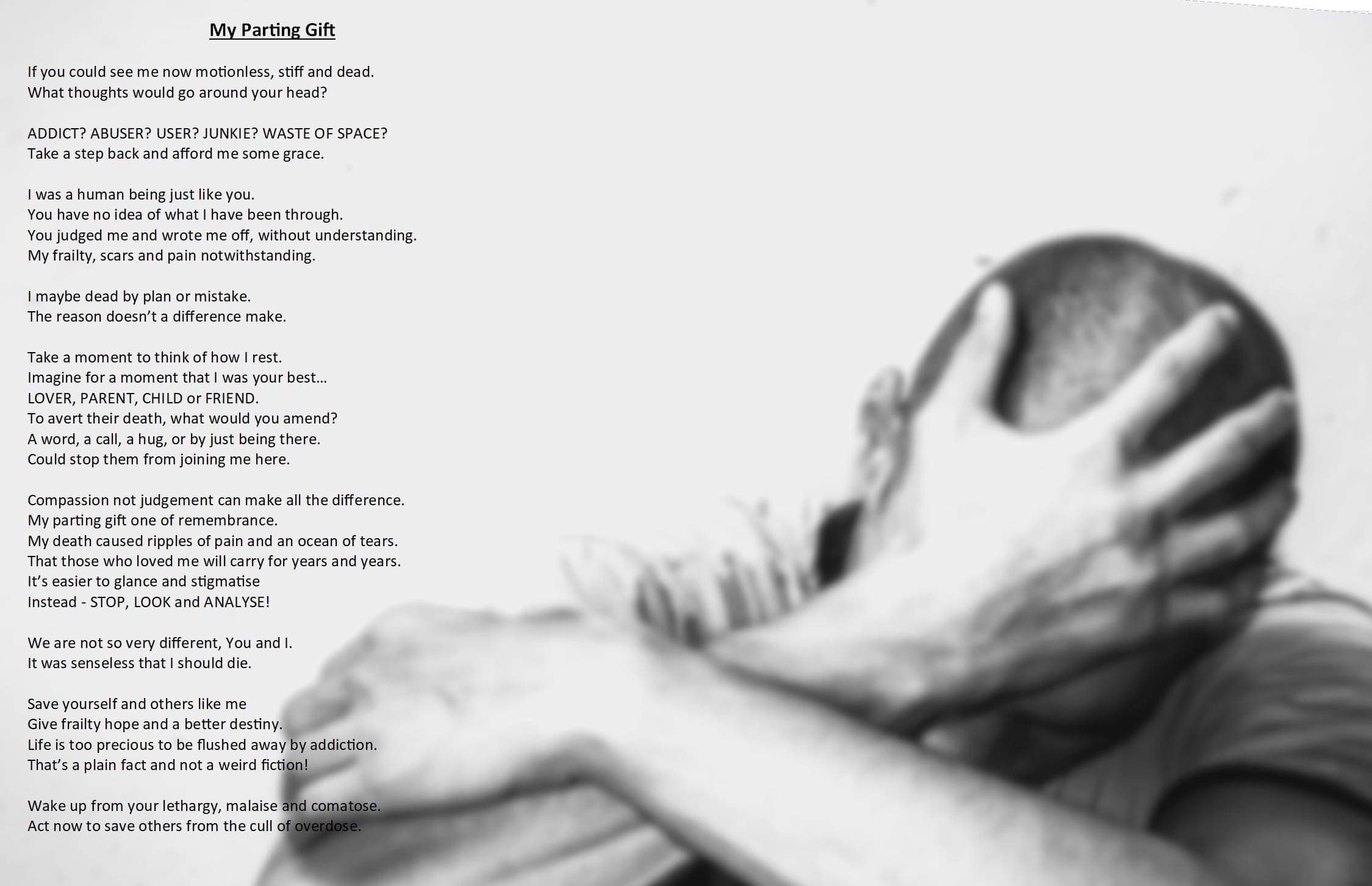#StopTheDeaths 2023
SUBMISSIONS
“Keyana, lived experience
I experienced a lot of trauma throughout my life that lead me to a life of hell, I remember being so ashamed carrying this secret I lost my family, friends and who I was as a person.
I’ve lost a lot of people through overdoses and it’s crazy to think about the amount of people who have actually died from drug related deaths, but the one that hit me the hardest was my best friend who died on October 29th, 2021. Ryan was a big part of my life, and he lived life to the fullest, he was such a kind caring person and I miss him dearly.
I believe in this movement so much because drug related deaths can be prevented the majority of the time, Ryan died of a methadone overdose and when I got that call that he had passed away my whole world came crashing down I was only 5 months into my recovery at this point.
I knew he would never want me to go back on drugs so his memory kept me going, I have changed my whole life around I’m currently working as a peer support worker at we are with you and it feels so good being able to help others in similar situations as I was in, I believe in stop the drug deaths and I appreciate you giving people a platform to have a voice to thank you!”
Service worker
“I think poor political decisions were made by reducing the funding to the ADPś around 2014/15 and this was followed by almost yearly increases in drug related deaths. As a frontline worker in the city centre, I work with people that are often entrenched in homelessness, substance use, prison, involvement in prostitution and regular hospital admissions. A significant cohort of this group of people suffer regular accidental and sometimes fatal drug overdose. It is well established that the risk of fatal overdose increases when leaving prison. I am not aware of any service provision for those that are on PRISON REMAND which is a very common occurrence for many people with drug related issues. (male or female prisons). I think it is imperative that there needs to be Link Workers based within the prison remand system using a targeted approach. It would need to provide a quick response to need given the nature of the prison remand system. I think one of the most effective ways to reduce drug related deaths is through the provision of four crisis intervention centres (North, South, East and West of Glasgow) Many people in Glasgow are leading complex lives, exacerbated by poor and dangerous substance use practices (particularly people who inject substances). This and their wider psycho- social needs are often too high to be met immediately by their local ADRS and require a quick response intervention in a safe, short term residential setting that provides 24 hour medical and social care over a minimum 21 day period. I would like to see at least one of these crisis intervention units designed for women only, and where possible, with their children, as mothers are the main caregivers. The design of a womenś crisis intervention unit would clearly need to differ in terms of resources. It is vital that the staff within these crisis units are highly skilled, person centred and motivated.”
Person with lived experience
“In the Borders you see folk, hear folk talk about there not being enough help to talk about their issues and personal experience. It shows me there’s a lack of services for people to talk about their usage past which leads into people taking their lives.”
Nicole, Service Worker
“Bereavement is an experience that is unique to everyone, but few jobs experience deaths in the context that we do. Upon dealing with the news of a death for someone I had a very good relationship with within my service, the police turned up and announced that they were here due to her suspected drug related death and they had to check her flat for the evidence of drugs. To the police, all they knew was that she was a woman who used drugs, and it was their job to try to find one possession: drugs. Of course that is their job, and they can’t possibly know everyone individually, however I thought at that moment of all the things she was other than a woman who used drugs, something that paled in comparison to her many qualities and the essence of who she was…” Read more
Ian, Lived Experience
“I have majorly been affected by drug deaths, the one that caused the greatest impact was the death of my father-in-law in my own home. Having experienced this in the place where I still live have caused major traumatic experiences which are ongoing. I feel that my mental health has been impacted severely due to this, I just don’t know what to do, I use drugs to numb how I feel but I can’t continue like this.”
…
“Attending the Dumbarton Engagement Group has been a massive change for me, it has let me know what positive changes are available. Before coming to the group, I did not know about the MAT Standards. I also think that the roll out of Naloxone has helped, and the availability of the training has helped in the reduction of drug related deaths.”
…
“Decriminalisation would help as people would not be punished for their drug use and be offered help instead of judged and stigmatised which can lead to people using alone and dying.
I also think that by making the drug deaths a health issue this will encourage people to ask for help and support rather than feel isolated from the rest of society. “
Kerry, Family & Front line Worker
“I lost my mum to a drug-related death in Jan 2019, she was only 50 years old and had struggled for approximately 26 years. I have seen the woman i should have relied on for life guidance and unconditional love, slowly vanish before my eyes. Everything that drugs could have taken from her, it did. Her looks, her health, several homes, her dignity, her family/children and ultimately her life. I always describe it as watching the longest drawn-out suicide attempt unfold, every day of that 26 years I felt I was mentally preparing for her to die and yet when it finally happened i was in a complete state of shock and denial. What followed was a delayed then drawn out bereavement because it was such a complicated grief, i was fuelled mostly by anger- at her, at services, at GP’s, police, the procurator fiscal process and the general feeling of the unfairness of it all. All the things she missed out on in life and continues to miss now in her death. I had and still suffer from trauma and night terrors surrounding my childhood, watching her continue to struggle in my adulthood and then how she eventually died. Even though heroin was her main struggle, it was Polysubstance use that contributed to her death, with Heroin, cocaine, alcohol and methadone named in her toxicology report. I have since decided to use my mums and my own negative experiences to try and positively impact the lives of others that are living in similar circumstances- I am determined that something positive needs to come from all this. “
Friend
“Michelle was a good friend to me and when I heard about her going missing, I had a look about on the streets and the golf course and just the general area and asked her friends if they have seen her and then I found out that she got jailed but sadly passed away. I do miss talking to her as a friend and seeing her about.”
Friend and lived experience
“My pal Matthew was a good lad, depression set in and he died on tablets. Seeing him that last night the dread I felt something was wrong. After 3 days me and mam went and found him dead, had been there 3 days. I just froze. I blamed myself, thought maybe if I’d done more, offered him in that night, he wouldn’t be gone, if he’d have had help with his depression alcohol, and drug use he would have lived. It impacted me in such a way for me to look at how my situation was and moved to the Borders for a fresh start and as a way for me to explore recovery methods which slowly veered me on the right path.”
Erin, Lived Experience
“I lost my dad to overdose, he passed away in front of me and this has really affected me. When this happened, no one had Naloxone on them, when the ambulance attended, they did not have Naloxone either, I felt helpless and this has led to a downward spiral in my own drug use and mental health, I just gave up. My stepdad also passed away and this was drug related too. My mum is in a care home, so I have no support network, it is really hard.”
…
“Naloxone is the most important thing I have seen as if we had one that day my dad might still be here.
I am attending this group (Living Experience) and through coming here I can speak of what has happened to me and I hope this can help with any changes that are to be made in my area. I also attended the Peer Event through the group, and I enjoyed listening and being a part of this.
I have also been attending my local recovery café which gives people struggling with their addiction somewhere to go. I am also beginning to volunteer with them soon.”
…
“Naloxone rolled out everywhere. “
“Recovery services and supports need to be better advertised.”
“Services need to work together to provide recovery and mental health support.”
“More peer led events and input from living experience to help others.”
“Early intervention and support for children whose parents use or sell drugs.”
“Reduce the stigma of drug use through sharing personal stories of how we have been affected.”
Kerry, Family & Front line Worker
“The introduction of Naloxone is definitely a positive in my eyes. Whilst we might not be able to stop our loved ones from having these issues, Naloxone is something I know I would have found comforting to have to hand when i was growing up. Giving families/friends/partners etc the means to do something in an emergency is so important. Naloxone gives back a small sense of control in a worst-case scenario.
I also see the voices of families and those with lived experience being introduced a lot more within services and public conferences/discussions etc, i think this can go a long way in educating individuals as a prevention tactic. Putting real faces and names to stories and reducing stigma and discrimination simultaneously. “
Kerry, Family & Front line Worker
*on how to reduce drug related deaths
“Continuing with promotion and raising awareness of Naloxone. Pushing forward with giving those with lived experience a platform to be heard more, especially within recovery, educational and health/social care settings. Follow up care when someone goes through detox/rehabilitation instead of just putting them back out into the same environment with no support. Linking mental health and substance use services, stop treating mental health and substance use as separate entities - more often than not the two are interlinked and both need addressed. reducing stigma in communities, raising awareness that problem drug use can affect anyone at any time regardless of their upbringing, financial situation, status, location etc. And last but not least ensuring that a person experiencing a drug problem and those who support them are continuously being made aware of their rights in every setting. When services or individuals give poor service, breach codes of conduct or indirectly/directly discriminate this can often prevent from further engagement for treatment or support due to mistrust and fear . Knowing your rights can ensure that people know how to self-advocate and feel empowered to challenge systems or individuals, when they feel it is required. “
Mother
“I am writing this in the hope of helping me understand why I lost my son James at just 29 years old. To others, he is just a statistic - another drug's death. But he was my beautiful boy. I am sure the current police investigation will conclude he was an adult who made a choice that resulted tragically in an accidental overdose.
I strongly feel that there were so many missed opportunities that may have changed the course of events and I hope that services will take the time to reflect and learn. And of possible policies or practices to change to reduce the risk of another mother going through this unbearable torture, a mother's worst nightmare, and hopefully, even save just one young life from ending before it should. Read more














